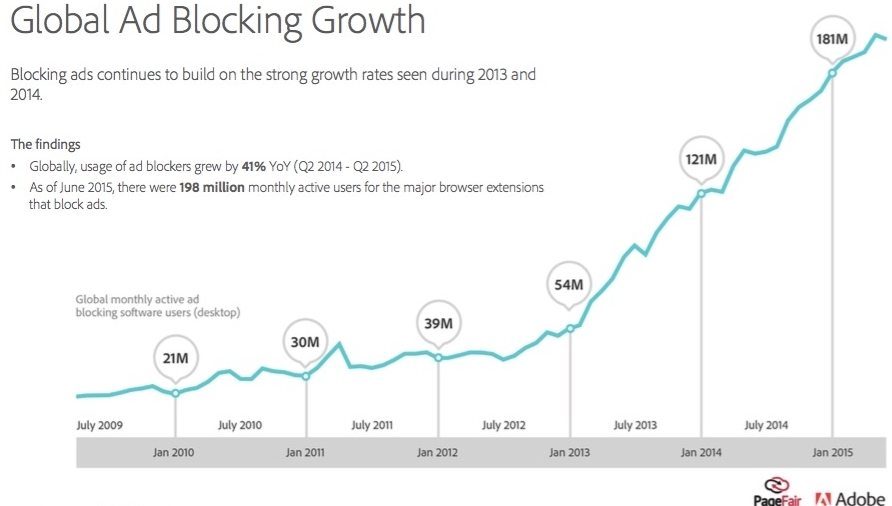
September 15, 2015
Last week I came across one of the more extreme commentaries on advertising I’ve ever encountered. Appearing on MediaPost, it was a diatribe about ad-blocking aimed squarely at Randall Rothenberg, the head of the Interactive Advertising Bureau, who is allegedly responsible for letting this scourge grow to its current malignant state. But what really got my attention was this passage, near the top:
Ad-blockers have given consumers a voice in the online ad world — and that voice is loud, it is clear and it is filled with venom.
Track our behavior without our consent and serve “targeted” ads that make us feel stalked. —Block you.
Serve us ads that cover up the inferior content we read mostly to kill time. —Block you.
Force auto-play video ads down our throats, so we have to race to find our mute button. —Block you.
Serve us flashy ads that slow down the page load. —Block you.
Allow anyone to buy ads through exchanges, so our computers get infected with malware. —Block you.
Serve us too many damn ads on a single page of content. —Block you.
In fact, the IAB has a detailed code of conduct for its members, though that obviously hasn’t fixed the problem. But Randy—whom (full disclosure) I’ve known for years, and who gave me a lovely blurb for my most recent book—doesn’t really need me to defend him. The point is that the sins listed here—online stalking, auto-play videos, malware infestations, rampant clutter, and so on—have become ubiquitous, and they’re almost guaranteed to make consumers venomous. They certainly make me feel venomous. And as the author of this post was trying to point out, they make a terrific case for ad-blocking.
According to a report that was cited over the weekend in TechCrunch, the use of ad-blocking software globally is up more than 40 per cent over the past 12 months. Already the growth curve is starting to look like a hockey stick, and it’s bound to get steeper now that iOS 9, which launches tomorrow, will be supporting it.
That same report, from Adobe and an anti-ad-blocking firm called PageFair, maintains that ad-blocking is going to cost the world’s Web publishers nearly $22 billion this year. And this is happening just as the Internet is becoming the leading ad medium: In 2013, online advertising in the US approached $43 billion, passing broadcast television for the first time. The question is, what to do?
The first thing might be to check out the comments on the announcement of that Adobe/PageFair report. One user writes, “someone leaching (sic) off me to sell my browsing behavior without my permission is morally bankrupt. The model needs to die.” Another writes, “Maybe if the ads weren’t so bloated, annoying, difficult to distinguish from content all the time, and didn’t spread infections through ad servers that are poorly maintained they wouldn’t be blocked as much.” It goes on.
Jeff Jarvis argues that advertisers and publishers need to think in terms of building relationships with users, offering services to help would-be consumers rather than just trying to sell stuff. I’ve long maintained—most recently in an interview at Contagious—that advertisers need to stop interrupting people and start entertaining them. We both agree that the industry needs to adopt new measures of success that reflect the world as it is today.
Like TiVo with television, like piracy with the music business, ad-blocking is a wake-up call. Industry figures talk about a tacit “social contract” between online publishers and users of ad-supported media. But it’s a contract users don’t have any say in—and when people feel exploited, and digital technology gives them the means to do so, they’re going to tear that contract right up. Advertisers and publishers love to revel in the data possibilities that digital provides. But they treat their audiences as if we’re still living in the world of analog TV, when the only thing you could do about obnoxious and intrusive ads was to get up and change the channel. Viewers are users now—and that means they’re going to write their own contract. Whether ads will have a place in it depends largely on how advertisers behave.










Comments
Comments are closed here.